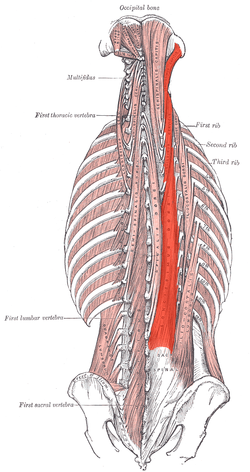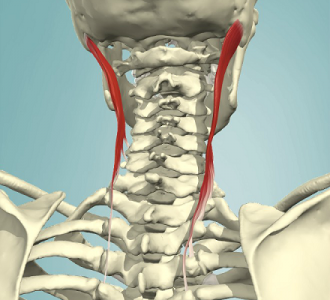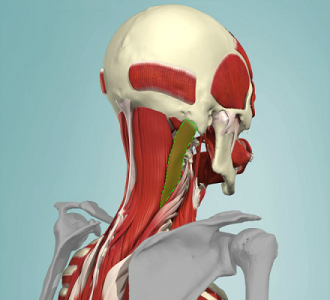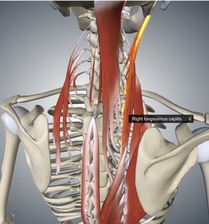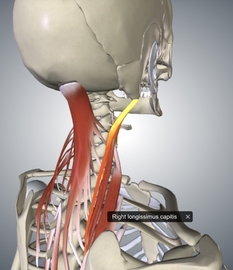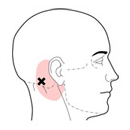Longissimus Capitis: Difference between revisions
No edit summary |
No edit summary |
||
| Line 20: | Line 20: | ||
|} | |} | ||
== Origin == | == Origin == | ||
| Line 32: | Line 30: | ||
Posterior margin of mastoid process and the temporal bone.<ref name="wh" /><ref name="PP">http://www.primalonlinelearning.com/cedaandp/muscular_system/muscles_of_the_back.aspx#longissimuscapitis</ref> | Posterior margin of mastoid process and the temporal bone.<ref name="wh" /><ref name="PP">http://www.primalonlinelearning.com/cedaandp/muscular_system/muscles_of_the_back.aspx#longissimuscapitis</ref> | ||
[[File:Longissimus_capitis_insertion.jpg|frameless]] | [[File:Longissimus_capitis_insertion.jpg|frameless]] | ||
== Nerve Supply == | == Nerve Supply == | ||
| Line 41: | Line 37: | ||
== Blood Supply == | == Blood Supply == | ||
Muscular branches of the occipital artery from the external carotid artery.<ref name="ae" / | Muscular branches of the occipital artery from the external carotid artery.<ref name="ae" /> | ||
== Action == | == Action == | ||
Revision as of 07:34, 5 February 2022
Original Editor Oyemi Sillo
Top Contributors - Evan Thomas, Lucinda hampton, Merihan Hussein, Kim Jackson, Oyemi Sillo, WikiSysop, 127.0.0.1 and Frank Edmund IheakamIntroduction[edit | edit source]
The longissimus muscle is not one muscle, but a collection of three separate muscles that run up nearly the entire length of both sides of the spinal column, from the lower back up to the neck. These three muscles include:
- Longissimus capitis
- Longissimus cervicis
- Longissimus thoracis[1]
Longissimus belongs to the intermediate column of the Sacrospinalis group of muscles.[2]
Longissimus Capitis[edit | edit source]
Longissimus Capitis depicted below.
Origin[edit | edit source]
Posterior surface of transverse processes of T1 to T5 and the articular tubercle of C4 to C7.[3]
Insertion[edit | edit source]
Posterior margin of mastoid process and the temporal bone.[3][4]
Nerve Supply[edit | edit source]
Dorsal rami of cervical and thoracic spinal nerves (C6 to T4).[5]
Blood Supply[edit | edit source]
Muscular branches of the occipital artery from the external carotid artery.[5]
Action[edit | edit source]
Acting bilaterally, extends and hyperextends head; acting unilaterally, flexes and rotates the head ipsilaterally.[3]
Trigger Point Referral Pattern[edit | edit source]
Pain is usually referred around the ear, but can also refer nearby into the neck and behind the eye.[6]
Muscle Activation[edit | edit source]
References[edit | edit source]
- ↑ Study.com Longissimus Available:https://study.com/academy/lesson/longissimus-muscle-origin-insertion-function.html (accessed 5.2.2022)
- ↑ Gray, Henry. Anatomy of the Human Body. Philadelphia: Lea & Febiger, 1918; Bartleby.com, 2000. www.bartleby.com/107/.
- ↑ 3.0 3.1 3.2 http://www.wheelessonline.com/ortho/longissimus_capitis_1
- ↑ http://www.primalonlinelearning.com/cedaandp/muscular_system/muscles_of_the_back.aspx#longissimuscapitis
- ↑ 5.0 5.1 http://www.anatomyexpert.com/structure_detail/5205/
- ↑ http://abbottcenter.com/bostonpaintherapy/?p=1492
